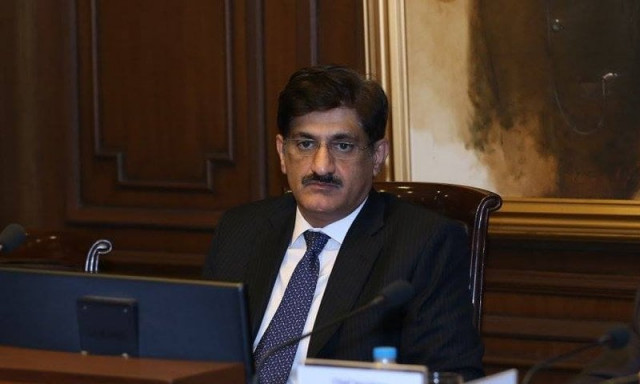Speakers press for effective implementation of human rights laws
Decry the gap between legislation and implementation laws, says Sindh CM

Sindh CM Murad Ali Shah. PHOTO: PPP
He expressed these views while addressing a seminar organised by the Pakistan Institute of Labour, Education and Research (PILER), to mark the 71st anniversary of the Universal Declaration of Human Rights, on Wednesday.
Besides the CM, PILER Executive Director Karamat Ali, Sindh Human Rights Commission Chairperson Justice (Retd) Majida Razvi, human rights activist Anis Haroon, Adviser to Sindh CM on Human Rights Veerji Kohli and Adviser to Sindh CM on Law, Environment and Coastal Development Barrister Murtaza Wahab partook in the seminar as speakers. The programme also included the participation of civil society members, who voiced their concerns regarding human rights violations.
No compromise on human rights, says Bilawal
By and large, the dialogue shed light on subjects pertaining to the Sindh Tenancy Act, rights of agriculture workers, media workers, transgender persons, minorities, women and labourers, trade unions, bonded labour, forced conversions, displacements as a consequence of KCR and evacuation of Empress Market, student unions, functioning of child protection units and appointment of women protection officers.
The participants of the seminar particularly pointed towards the persistent gap between legislation for human rights and the implementation of relevant laws, also identifying that the implementation often takes place at a snail's pace.
Speaking in this regard, CM Shah said that the law for the restoration of student unions would soon be presented in the Sindh Assembly and thereafter would be referred to relevant committees for vetting. He further said, "I will ask the provincial assembly's standing committee on law to consult with student bodies and civil society organisations [for legislating on student unions]," adding that he too suffered the ban on student unions. "When I joined university in 1984, then too, a ban was imposed on student unions," the CM explained.
He assured that the provincial government was committed to complying with international human rights obligations and added that the Sindh government had extensively legislated on the subject of human rights.
The CM said that Pakistan Peoples Party Chairperson Bilawal Bhutto Zardari was striving to ensure the provision of rights to all and this is why he accepted, first the membership and later the chairmanship, of the National Assembly's Human Rights Committee.
He said that he understood the problems faced by agriculture workers as he himself came from a family of agriculture workers and stressed that meaningful dialogue was required between zamindars [landlords] and haris [farmers].
Also speaking on the occasion, PILER Executive Director Ali recalled that the United Nations Declaration on Human Rights was the first document aimed at providing people their fundamental rights. Particularly referring to the rights of freedom of expression and to form association, he urged the CM to carry out a transparent and objective assessment to gauge whether these rights are given to the citizens or not.
Appreciating the provincial government for making advancements in legislating on labour rights, Ali, at the same time, pointed out that labourers continued to suffer due to "inadequate Industrial Relations Act".
Ali concluded his address by congratulating the Sindh government for passing a bill seeking the restoration of student unions.
Human rights activist Haroon said that the Universal Declaration of Human Rights guaranteed rights for every section of the society. She acclaimed the Sindh government "for making the largest number of laws on child marriage," and stressed the need for establishing "functional child protection units."
Human rights must be central to diplomacy
Child marriages continue to be a big problem despite the introduction of Child Marriage Restraint Act, said Haroon, adding that functional child protection units can help with providing shelter and assistance to the victims of child marriage.
She also highlighted the need for making all-out efforts to empower women, saying that merely passing a law on domestic violence will not solve the problem. Addressing the CM, she reminded him that the Sindh government had earlier talked about plans for distributing land among women and urged him to work towards this purpose.
Other speakers emphasised the need for implementing human rights laws, particularly those pertaining to forced conversions, in Sindh, identifying bureaucracy as the main hurdle in the way of implementing these laws.
Published in The Express Tribune, December 12th, 2019.



















COMMENTS
Comments are moderated and generally will be posted if they are on-topic and not abusive.
For more information, please see our Comments FAQ